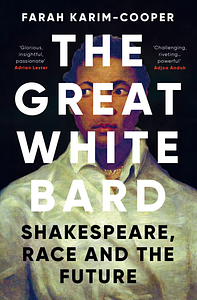Take a photo of a barcode or cover
challenging
informative
reflective
medium-paced
the best part of this book, in my opinion, is the intro and the first chapter. karim-cooper's overarching point here is, i think, a really good one: that shakespeare doesn't need to be put away entirely, because his work still has the power to inspire and affect, but that if we're going to keep him in our curriculums and lives, we need to interrogate the way his plays deal with race. the first chapter examines the history of shakespeare's legacy and the way he became a key figure in english culture (spoiler: it was not just because his plays were good; it was also nationalism and colonialism!). this goodreads review notes that
For me the strength of her book is not in her general assertions but in the wealth of minute specific details she has gleaned from her reading and research: early modern references to Moors and Jews, various 16th century depictions of Cleopatra, techniques for preserving heads piked on London Bridge or for lightening or darkening faces on stage, threatened miscegenation in most of the race plays...
and i would agree; maybe i'm just a history fan, but i think this book is at its strongest when it's applying historical context and analysis (stuff like the origin of the word "barbaric," or the various meanings of "fair," "foul," and "strange"). moreover, karim-cooper's writing style is lively and easy to read; people who don't spend their time reading classical literature might disagree, but i found it quick reading for nonfiction. the first chapter i would gladly give five stars.
the book overall i'm giving four, because i wish it had gone further. while karim-cooper's analysis is good, it's sometimes near outweighed by summary of the plots of each play (helpful for those not entirely familiar with shakespeare, yeah, but it made the book less focused, imo). more than that, though, i wish the book had challenged shakespeare more. while karim-cooper discusses the racism inherent in many of his finest lines and patterns of imagery, and while she spends time on each of his so-called "race plays," she still cuts shakespeare a lot of slack, often writing that she likes to think his plays were meant to challenge societal bigotry rather than reproduce it. which... i mean, i'd also like to think that, but come on, why are we still searching for a way to make the merchant of venice progressive, actually? one of my favorite articles about shakespeare is madeline sayet's "interrogating the shakespeare system," which also examines shakespeare as a tool of white supremacy, except it's much sharper. i wouldn't say karim-cooper is reverent toward shakespeare, exactly, but sometimes she seems to value his work to the point of apologetics.
then again... i can't entirely blame her. karim-cooper is a professor of shakespeare studies. she works at the globe. of course she likes his stuff, and of course she thinks he's still relevant! (also, like, who am i to judge; i've been riding a shakespeare hyperfixation since my freshman year english class.) and also, honestly? a lot of people are just too fucking racist to imagine questioning shakespeare at all. karim-cooper notes in the first chapter that she constantly gets emails mocking her for trying to make shakespeare "woke," by, uh... doing race-blind or race-conscious casting instead of only casting white people? maybe i think she should have been meaner to the bard, but, like, one glance at the reviews of this very book prove that some people can't handle even that.
the dear friend i buddy-read this with summed it up perfectly, i think: on some level, the book is directed "to an audience of people who are committed to stanning shakespeare and need to be convinced not to be racist (vs someone who is committed to not being racist and needs to be convinced to stan shakespeare)." so not exactly to me. that said, i still think it's a valuable contribution to the shakespearean conversation! i'm glad i read it, i think karim-cooper's writing is very engaging, and i hope this book influences teachers, students, and fans of shakespeare's to do some hard but worthwhile examination of the difficult parts of the bard.
informative
slow-paced
challenging
funny
informative
medium-paced
challenging
informative
medium-paced
I love Shakespeare and found this reading of his works interesting. It’s relatively accessible (though knowing the plays helps) and it helps make the bard more modern. A little clunky and repetitive in spots but mostly very good.
Thanks to NetGalley and the publisher for the eARC of this novel. 4.5/5 stars.
I've been following the Globe's move toward antiracism, so I was super excited to see this and be accepted for it. It does discuss the typical Shakespeare race plays (e.g. Othello) but it also does a phenomenal job discussing race and racial formation within other Shakespeare plays as well. I also appreciated how it didn't say "oh don't teach Shakespeare" but introduced ways to reframe him and our thinking of him and his plays. I also appreciated the historical information in it as well. I only docked it 1/2 a star because I don't think it's accessible to those who do not have somewhat of a background in racial formation theory or studying race; however, I do think they would still benefit from reading this...it might just require some additional information to truly understand.
I've been following the Globe's move toward antiracism, so I was super excited to see this and be accepted for it. It does discuss the typical Shakespeare race plays (e.g. Othello) but it also does a phenomenal job discussing race and racial formation within other Shakespeare plays as well. I also appreciated how it didn't say "oh don't teach Shakespeare" but introduced ways to reframe him and our thinking of him and his plays. I also appreciated the historical information in it as well. I only docked it 1/2 a star because I don't think it's accessible to those who do not have somewhat of a background in racial formation theory or studying race; however, I do think they would still benefit from reading this...it might just require some additional information to truly understand.
Listened to this as an audiobook, enjoyed the experience.
informative
reflective
medium-paced
challenging
informative
reflective
medium-paced
informative
reflective
slow-paced





